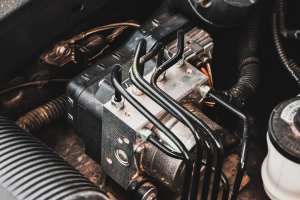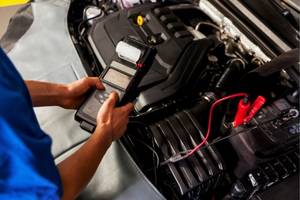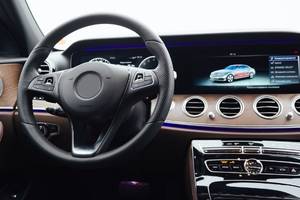Introduction
Ever wondered about that small yet essential device in your Buick that's responsible for controlling various aspects of your car’s body functions? You’re likely thinking of the Buick Body Control Module (BCM). This advanced piece of technology acts as the central nervous system for your vehicle’s electronic systems, controlling everything from your power windows to the security system. In this guide, we’ll simplify the Buick Body Control Module, explain how it works, and offer tips on maintaining it to make sure your Buick continues to perform at its best. So, buckle up and let’s dive right into the world of the BCM!
1. What is a Buick Body Control Module?
The Buick Body Control Module, often referred to as the BCM, is like the brain of your car's body. It's a smart device that's tasked with managing and controlling various electronic components in your vehicle. From your power windows and mirrors to the central locking system, your car's BCM has a say in it!
Now, you might be wondering, how does this relate to your Buick? Well, your Buick Body Control Module is designed specifically for your vehicle model — whether you're driving a Buick Enclave, Regal, Encore, or any other model, there's a unique BCM working continuously behind the scenes for you.
Here's a quick look at some of the key features that your Buick Body Control Module controls:
- Unlocking and locking your doors: Ever noticed how your car automatically locks after you start driving? Yep, that's your BCM at work!
- Controlling your car’s lighting: From your headlights to your interior lights, your BCM makes sure they're on when they need to be and off when they don't.
- Managing your car’s power windows and mirrors: Your BCM manages the electronic motors that move your windows and mirrors.
- Monitoring your vehicle's security system: Your BCM plays a crucial role in car security, working with your car's alarm system to protect your ride from thieves.
Hey, it's like your personal car butler, right? Always on duty, making sure everything is running smoothly. But just like any other part of your car, your Buick Body Control Module needs a little TLC to keep it in tip-top shape. Stay tuned as we dive deeper into how the Buick Body Control Module works and how you can maintain it to ensure your ride stays smooth and secure.
2. How the Buick Body Control Module Works
So, now that we've covered the basics of what a Buick Body Control Module is, let's get deeper into the basics of how it operates. Believe it or not, this little device is quite the multitasker!
The Communication Maestro
At its core, the Buick Body Control Module is a communication hub. It's constantly receiving and sending out signals to various parts of your car. Think of it as the conductor of an orchestra, coordinating all the different instruments (or, in this case, car parts) to work together in harmony.
The BCM operates on a system of inputs and outputs. For example, when you press the unlock button on your key fob, that’s an input signal. The BCM receives this input, processes it, and then sends an output signal to unlock the car doors. It's a two-way street of signals, keeping your car's body functions running smoothly.
The Watchful Guardian
Aside from controlling your car's basic functions, your Buick's BCM also plays an important role in vehicle security. It works in tandem with your car's alarm system, monitoring for any signs of violation. If someone attempts to break into your car, the BCM will trigger the alarm, alerting you and those around to the potential threat.
A Symphony of Sensors
In order to do its job effectively, the Buick Body Control Module relies on a network of sensors throughout your car. These sensors feed information to the BCM about everything from door positions to light levels. Equipped with this data, the BCM can make informed decisions about how to control your car's body functions.
And that, in a nutshell, is how the Buick Body Control Module works. It's a constant whirl of communication, decision-making, and action, all designed to make your driving experience as smooth and secure as possible. But just like any hardworking device, the BCM can face problems. Stay tuned as we dive into the common issues that can arise with your Buick Body Control Module, and how you can fix them.
3. Common Problems with the Buick Body Control Module
Now that we've discussed how the Buick Body Control Module operates, it's time to address some common issues that might happen with it. After all, no system is perfect, and your BCM is no exception. Let's take a look at some of the common trouble spots.
Unexpected Locking or Unlocking
Your car doors randomly locking or unlocking on their own can be disturbing, to say the least. If you've ruled out a mischievous friend with a spare key fob, the culprit could be your Buick Body Control Module. An unexpected signal from the BCM could lead to these ghostly activities.
Lights Acting Up
Another common issue with the BCM is irregularities with your vehicle's lights. If your headlights, interior lights, or dashboard lights flicker, dim, or refuse to turn on or off, your Buick Body Control Module might be the one to blame.
Security System Sensitivity
Remember how the BCM works hand-in-hand with your car's security system? Well, sometimes that relationship can be a bit over energised. If your car alarm is triggered without any apparent cause, it's possible that the BCM is sending false signals.
Windshield Wipers Wiping When They Want
If your windscreen wipers have a mind of their own—turning on and off or changing speed without your command—your Buick Body Control Module might need attention. The BCM controls these, too, and an issue can lead to unpredictable wiper behavior.
Identifying these problems early on can save you a lot of stress (and potentially, a lot of money) in the future. So, what do you do if you start noticing these issues? Well, stay tuned for tips and tricks on maintaining your Buick Body Control Module, coming up next.
4. Tips for Maintaining Your Buick Body Control Module
Now that we've identified the common issues, let's talk solutions. Maintaining your Buick Body Control Module doesn't have to be a difficult task. Here are some handy tips to keep your BCM in peak condition.
Regular Inspection
A regular check-up of your BCM can go a long way in preventing potential headaches. This doesn't mean you need to become a car mechanic overnight—just make it a point to take your vehicle to a trusted technician for regular inspections.
Keep it Clean
Dirt, dust, and moisture can wreak havoc on your Buick Body Control Module. Make sure to keep the area around your BCM clean to prevent these elements from causing damage. Your car's user manual should provide instructions on how to safely clean this area.
Handle with Care
Remember, your BCM is a fine and breakable piece of technology. When handling the module or any related components, it's important to be gentle. Rough handling can lead to unnecessary damage.
Prompt Repairs
If you see any of the issues we've discussed earlier, don't delay repairs. Ignoring small problems can lead to bigger issues down the line. The sooner you address the issue, the less likely it is to escalate.
In conclusion, taking good care of your Buick Body Control Module is an investment in your vehicle's longevity and your peace of mind. As long as you keep these tips in mind, your BCM should continue to function smoothly, keeping you safe and secure on the road.
Conclusion
The Buick Body Control Module is an essential component that makes sure the smooth operation of many of your car's electronic features. By managing everything from door locks to lighting and security systems, the BCM plays an important role in your driving experience. Understanding how the BCM works and recognizing common issues can help you maintain it properly and avoid potential headaches. Regular inspections, keeping the module clean, and addressing problems quickly will help keep your BCM in top shape, making sure your Buick remains reliable and secure on the road. With these insights and tips, you’re now equipped to keep your vehicle’s body control system functioning effectively.
FAQs on
Maintaining Your Buick Body Control Module in 2025 : Comprehensive Guide
-
1. What is a Buick Body Control Module?
Ans.
The Buick Body Control Module (BCM) is a central electronic device in your vehicle that manages and controls several body functions. It supervises systems such as power windows, mirrors, door locks, lighting, and the security system, ensuring these features operate smoothly and in sync.
-
2. How does the Buick Body Control Module work?
Ans.
The BCM acts as a communication hub within your vehicle. It receives input signals from various sensors and user commands (like pressing a key fob button) and sends corresponding output signals to control functions such as unlocking doors or turning on lights. It also integrates with the vehicle's alarm system to monitor security and manage responses to potential threats.
-
3. What are common problems with the Buick Body Control Module?
Ans.
Common issues with the BCM include unexpected locking or unlocking of doors, irregular lighting behavior (e.g., flickering or dimming), over-sensitive or malfunctioning security alarms, and unusual windshield wiper operation. These problems often stem from the BCM's functionality and its communication with other vehicle systems.
-
4. How can I maintain my Buick Body Control Module?
Ans.
To maintain your BCM, perform regular inspections by a trusted technician, keep the area around the module clean and free from dirt and moisture, handle the module and its components with care, and address any issues quickly to prevent further damage.
-
5. What should I do if my BCM is malfunctioning?
Ans.
If you notice any problems with your BCM, such as unusual behavior of your car’s electronic systems or security alarms, it's important to have the issue diagnosed and repaired as soon as possible. Ignoring these symptoms can lead to more serious problems and potential safety risks.
-
6. Can I replace a faulty Buick Body Control Module myself?
Ans.
Replacing a faulty BCM can be complicated and requires a precise understanding of your vehicle’s electronics. It is usually recommended to have a professional technician handle the replacement to ensure proper installation and avoid possible damage to other systems in your vehicle.


